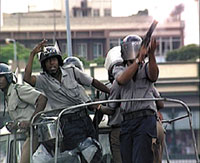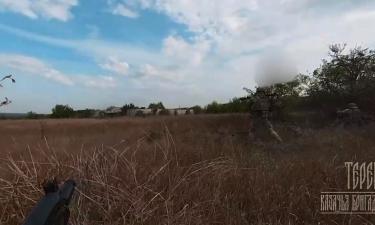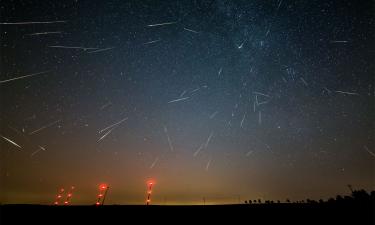Zimbabwean police arrest leader of main opposition party
Heavily armed Zimbabwean police arrested the leader of the main opposition party and killed a protester as they broke up a planned "Save Zimbabwe" prayer meeting in the capital.

Police spokesman Wayne Bvudzijena said police arrested Movement for Democratic Change leader Morgan Tsvangirai and other top party officials on Sunday as they "instigated people to come out and commit acts of violence."
Bvudzijena said that one man was shot and killed when 200 opposition party "thugs" attacked about 20 policemen. He told state television that three police officers were hospitalized with injuries.
The incidents occurred when police broke up the prayer meeting in western Harare, organized by opposition, civic, church leaders and anti-government groups.
Authorities had declared the prayer meeting to be illegal and in breach of a three-month ban on political demonstrations against economic misery and political repression, the AP said.
Riot and paramilitary police reinforcements, which had been deployed in the township by Friday, sealed off approaches to a sports ground in the Highfield township and fired tear gas near where the prayer meeting was scheduled.
Human rights observers in Highfield reported at least 100 arrests Sunday and sporadic skirmishes with police. Political leaders were taken from their cars as they approached the sports ground. Other drivers were turned back at road blocks after being told "it isn't safe" to go further.
Senior opposition party aide Eliphas Mukonoweshuro said witnesses told him that Tsvangirai was roughed up by police as he was taken away. Tsvangirai's lawyer, Harrison Nkomo, was also assaulted when he tried to intervene, the witnesses were quoted as saying.
Attorney Alec Muchadehama said lawyers were denied access to those arrested and police refused to give details of the police cells across southern Harare where they were being held.
Lawyers were seeking an urgent High Court ruling granting them immediate access, he said. Some food was delivered to the main Harare Central cell complex though it was not clear whether it reached at least 20 detainees taken there.
A Harare freelance photographer, Tsvangirayi Mukwahzi, was among the journalists arrested at the scene.
The leader of one opposition faction, Arthur Mutambara, was taken in for questioning, as were opposition lawmakers and church clerics. They were accused of defying a ban on the meeting, opposition spokesman Maxwell Zimuto told reporters.
Tendai Biti, a ranking member of the main opposition faction, and Nelson Chamisa, Tsvangirai's spokesman, were detained along with Lovemore Madhuku, head of the National Constitutional Assembly, a militant reform group.
Police spokesman Bvudzijena put the blame firmly on the prayer meeting participants.
He alleged that demonstrators tried to use children as human shields against the police and had picked up tear gas canisters and lobbed them back at police.
He said that "mobs" attacked a state owned bus and beat up passengers and robbed them of money and phones. They stoned the vehicle and tried to torch it, before turning to an army vehicle and setting that alight, he claimed.
"Police are now in charge of the situation" Bvudzijena said.
He gave no figures of the number of arrests.
Bvudzijena warned on state television Saturday that police would use "full force" to stop Sunday's prayer meeting. He displayed a factory-made scythe he said was among weapons seized from suspected opposition supporters.
"This weapon was to be targeted against police and we view it in a very dark light," he said.
Opponents of President Robert Mugabe blame him for acute food shortages, deepening economic woes, record inflation of some 1,600 percent - the highest in the world - and repression and corruption.
They have demanded the ouster of Mugabe, 83, Zimbabwe's only ruler since independence from Britain in 1980. Fliers for Sunday's prayer meeting proclaimed: "Zimbabwe Will Be Saved."
A respected international research organization, the Brussels-based International Crisis Group, last week forecast Zimbabwe faced the risk of "sudden major violence" as government opponents become emboldened to take to the streets.
Police officials last month imposed a three-month ban on demonstrations after skirmishes with opposition supporters. A squad of 16 police was attacked in the southwestern Harare township of Budiriro.
In the past, police routinely dispersed demonstrators with brutal force.
The Brussels group noted growing discontent among senior leaders of Mugabe's own ruling Zimbabwe African National Union-Patriotic Front party could likely also "energize" unrest.
Subscribe to Pravda.Ru Telegram channel, Facebook, RSS!





